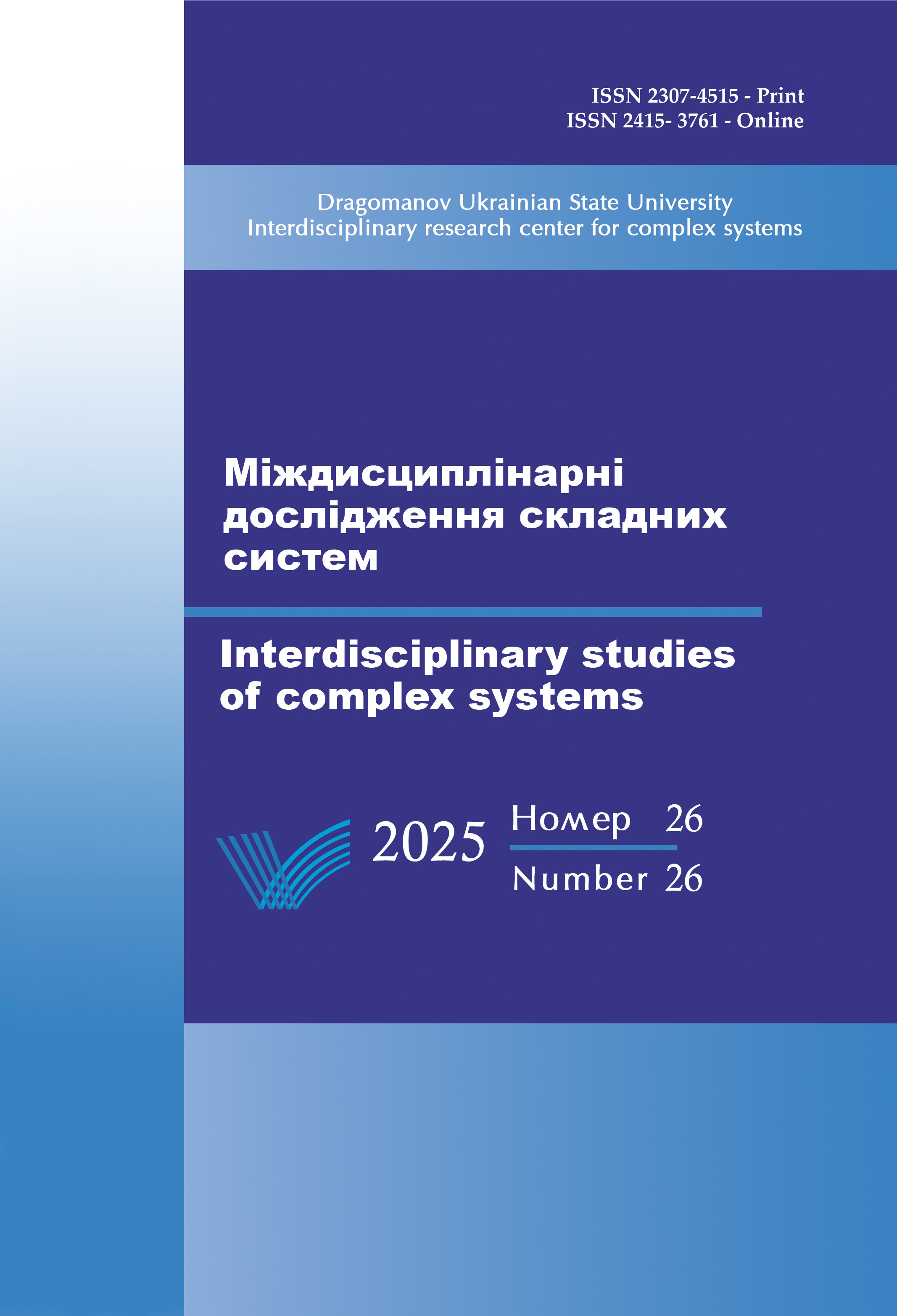TRANSFORMATIONS IN EDUCATION IN THE CONTEXT OF AI (PHILOSOPHICAL ANALYSIS)
DOI:
https://doi.org/10.31392/iscs.2025.26.170Ключові слова:
authentic intelligence, artificial intelligence, philosophical methodology, conceptual unity, contradiction, freedom, philosophical line of measure, academic integrityАнотація
The ability of philosophical methodology in optimizing the outputs of scientific and pedagogical study of artificial intelligence (AI) and its implementation in the educational process are analyses in the paper. Implementation of philosophical and methodological principles into a certain scientific research makes possible to highlight that the society forms intellect of a personality; artificial intelligence as a direct analogue of authentic intelligence can only exist in fantasy or as an ideal. Positive aspects of the use of AI are outlined, as well as main threats from its use which are of a methodological nature. In particular, scientific and pedagogical work will be carried out using simplified models of thinking and in a partly artificial reality. Examples of the introduction of philosophical methodology into scientific and pedagogical research are shown with the following goals: to stay within the philosophical line of measure; to reach the stage of tolerance, psychological stability. It is pointed that such threats could only be minimized but only on the global scale applying philosophical methodology. Conclusion: the task is extremely complex, but it is adequate to the complexity of AI challenges; its solution is possible only on the basis of combining efforts of politics, philosophy, ethics, psychology, economics and pedagogy. At this stage, philosophical and methodological guidelines in scientific and pedagogical activities can be taken into account as markers.
Посилання
. Andrushchenko T.I., Andrushchenko T.V., Vashchenko K.. 2023. Philosophy of culture as a systemic paradigm of modern education. Interdisciplinary Studies of Complex Systems. 22. 77–86. https://doi.org/10.31392/iscs.2023.22.077.
. Panukhnyk O. 2023. Artificial intelligence in the educational process and scientific research of higher education applicants: responsible boundaries of AI content. Galician economic journal. 83. 4. 202-211. https://doi.org/10.33108/galicianvisnyk_tntu2023.04.202.
. Wankhede C. 2024. ChatGPT vs Bing Chat: What's the difference and which one to use?. URL: https://www.androidauthority.com/chatgpt-vs-bing-chat-3292126/. [Accessed 01.02.2024].
. Halaweh H. 2023. ChatGPT in education: Strategies for responsible implementation. Contemporary Educational Technology 15(2). 421-423. URL: https://www.researchgate.net/publication/369040639_ChatGPT_in_education_Strategies_for_responsible_implementation. [Accessed 01.02.2024].
. Farrokhnia M., Banihashem S., Noroozi O. & Wals A. 2023. A SWOT analysis of ChatGPT: Implications for educational practice and research. Innovations in Education and Teaching International. https://doi.org/10.1080/14703297.2023.2195846.
. Sullivan M., Kelly A., McLaughlan P. 2023. ChatGPT in higher education: Considerations for academic integrity and student learning. Journal of Applied Learning & Teaching. 6 1, 31-40. https://doi.org/10.37074/jalt.2023.6.1.17.
. Yu H. 2024. The application and challenges of ChatGPT in educational transformation: New demands for teachers roles. HELIYON, https://doi.org/10.1016/j.heliyon.2024.e24289.
. Aberdein A. 2019. Courageous Arguments and Deep Disagreements. Topoi. 40. 1205–1212. https://doi.org/10.1007/s11245-019-09679-w.
. Stezhko Z., Shalimova N. 2022. Problems and Prospects for the Formation of a General Methodology of Knowledge. Philosophical Reflections. Filosofja-Sociologija. 33. 3, 197–205. https://doi.org/10.6001/fil-soc.v33i3.4765.
. Kozak P. 2018. The Many Faces of Conceptualism. Diametros. 57. 88-100. https://doi.org/10.13153/diam.1237.
. Kapiton A. 2023. Information and Computational Compence of Future Information Technology Specialists. Information Technologies and Learning Tools 93. 1. 49-67. https://doi.org/10.33407/itlt.v93i1.
. Hegel H. 1830. Encyclopaedia of the Philosophical Sciences. Part One. URL: https://www.marxists.org/reference/archive/hegel/works/sl/slintro.htm. [Accessed 01.02.2024].
. Baranov O. 2018. The Internet of Things (IoT): Tuning of Services by Bots with Artificial Intelligence. Information and Law. 4(27). 46-70. URL: http://ippi.org.ua/baranov-oa-internet-rechei-iot-regulyuvannya-nadannya-poslug-robotami-zi-shtuchnim. [Accessed 01.02.2024].
. Rudenko Yu., Drushlyak M., ChamonyaV., Ostrog M. & Semenikhin A. 2023. Developing the ability of students to resist information influences. Information Technologies and Learning Tools. 94. 2. 54-71. https://doi.org/10.33407/itlt.v94i2.5162.
. StezhkoZ., Khmеl T. 2023. Artificial intelligence as a sociocultural phenomenon: educational dimension. Anthropological Measurements of Philosophical Research. 24. 68-74. https://doi.org/10.15802/ampr.v0i24.295317.
. Nietzsche F. 2013. Beyond good and evil. [EBook #4363]. Translated by H. Zimmern. URL: https://epub.us/wp-content/books/beyond-good-and-evil-by-friedrich-wilhelm-nietzsche.pdf/. [Accessed 01.02.2024].
. Heidegger M. 2011. On the Essence of Truth. URL: https://aphelis.net/wp-content/uploads/2011/02/Martin-Heidegger-On-the-Essence-of-Truth.pdf. [Accessed 01.02.2024].
. Heick T. 2020. How 21st Century Thinking Is Just Different. Retrieved from. URL: https://www.teachthought.com/critical-thinking/21st-century-thinking/ [Accessed 01.02.2024].
. Bubnova I., Kazachenko O. 2018. Dynamics of the semantic content of the meaning of the word freedom. Psycholinguistics. 23. (2). 11-24. URL: http://nbuv.gov.ua/UJRN/psling_2018_23_2_3. [Accessed 01.02.2024].
. Freud S. 1930. Civilization and its discontents. URL: https://www.stephenhicks.org/wp-content/uploads/2015/10/FreudS-CIVILIZATION-AND-ITS-DISCONTENTS-text-final.pdf. [Accessed 01.02.2024].
##submission.downloads##
Опубліковано
Номер
Розділ
Ліцензія
Автори, які публікуються у цьому журналі, погоджуються з наступними умовами:- Автори залишають за собою право на авторство своєї роботи та передають журналу право першої публікації цієї роботи на умовах ліцензії Creative Commons Attribution License, котра дозволяє іншим особам вільно розповсюджувати опубліковану роботу з обов'язковим посиланням на авторів оригінальної роботи та першу публікацію роботи у цьому журналі.
- Автори мають право укладати самостійні додаткові угоди щодо неексклюзивного розповсюдження роботи у тому вигляді, в якому вона була опублікована цим журналом (наприклад, розміщувати роботу в електронному сховищі установи або публікувати у складі монографії), за умови збереження посилання на першу публікацію роботи у цьому журналі.
- Політика журналу дозволяє і заохочує розміщення авторами в мережі Інтернет (наприклад, у сховищах установ або на особистих веб-сайтах) рукопису роботи, як до подання цього рукопису до редакції, так і під час його редакційного опрацювання, оскільки це сприяє виникненню продуктивної наукової дискусії та позитивно позначається на оперативності та динаміці цитування опублікованої роботи (див. The Effect of Open Access).











